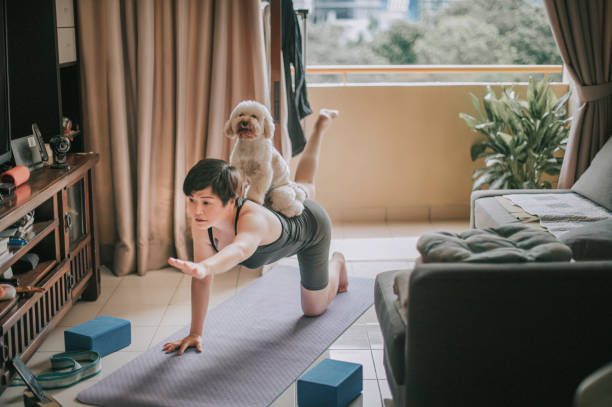Ensuring your pet’s well-being involves more than just addressing their immediate needs. A holistic approach to pet wellness integrates various aspects of health, including nutrition, physical activity, mental stimulation, and preventative care. This comprehensive strategy supports your pet’s overall quality of life and enhances their longevity. Here’s a detailed guide to adopting holistic practices for your pet’s health.
1. Holistic Nutrition
a. Balanced Diet
- Whole Foods: Opt for pet foods made from whole, natural ingredients. Avoid products with artificial preservatives, colors, or fillers.
- Varied Diet: Incorporate a variety of protein sources, vegetables, and fruits to provide a well-rounded diet. Consider including fresh, home-cooked meals or high-quality commercial foods designed to meet all nutritional needs.
b. Dietary Supplements
- Essential Nutrients: Consult your veterinarian about adding supplements such as omega-3 fatty acids, probiotics, or vitamins to address specific health needs.
- Tailored Solutions: Choose supplements based on your pet’s age, breed, and health condition. For example, glucosamine can support joint health in older pets.
2. Physical Health and Exercise
a. Regular Exercise
- Routine Activities: Establish a consistent exercise routine that suits your pet’s age and energy level. Activities like walking, running, or playing fetch are great for dogs, while interactive toys and climbing structures benefit cats.
- Variety and Fun: Mix up the activities to keep your pet engaged and motivated. For instance, agility training or puzzle games can add excitement to their routine.
b. Weight Management
- Monitor Weight: Regularly check your pet’s weight and adjust their diet and exercise as needed. Maintaining a healthy weight helps prevent obesity-related issues such as diabetes and heart disease.
- Portion Control: Follow feeding guidelines and avoid overfeeding. Measure out portions and avoid giving excessive treats.
3. Mental and Emotional Health
a. Enrichment Activities
- Mental Stimulation: Provide toys and activities that challenge your pet’s cognitive skills. Puzzle toys, treat-dispensing toys, and interactive games stimulate their minds and prevent boredom.
- Social Interaction: Encourage socialization with other pets and people to build confidence and reduce anxiety. Safe exposure to different environments helps your pet adapt to various situations.
b. Stress Management
- Safe Spaces: Create a comfortable and secure environment for your pet. Provide a quiet space where they can retreat when feeling overwhelmed.
- Calming Techniques: Use calming aids such as pheromone diffusers, soothing music, or anxiety wraps to help manage stress and promote relaxation.
4. Preventative Healthcare
a. Routine Veterinary Care
- Regular Check-Ups: Schedule annual veterinary exams to monitor your pet’s health and address any issues early. Regular vaccinations, dental cleanings, and parasite prevention are crucial.
- Health Screenings: For older pets or those with chronic conditions, consider additional health screenings such as blood tests or x-rays.
b. Preventative Measures
- Parasite Control: Use flea, tick, and heartworm preventatives as recommended by your vet. Regular grooming and inspections help detect and address infestations early.
- Dental Care: Brush your pet’s teeth regularly and provide dental treats or toys to promote oral health and prevent dental disease.
5. Grooming and Hygiene
a. Regular Grooming
- Brushing: Brush your pet’s coat regularly to reduce shedding, prevent matting, and distribute natural oils. The frequency depends on your pet’s coat type and length.
- Bathing: Bathe your pet as needed, using pet-friendly shampoos to avoid skin irritation. Over-bathing can strip their coat of natural oils.
b. Ear and Nail Care
- Ear Cleaning: Check and clean your pet’s ears to prevent infections, especially if they have floppy ears or are prone to ear problems.
- Nail Trimming: Trim your pet’s nails regularly to prevent discomfort and health issues. Use appropriate tools and techniques to avoid injury.
6. Holistic Therapies
a. Alternative Therapies
- Acupuncture: Consider acupuncture for pain management, arthritis relief, or overall wellness. It can complement traditional veterinary care and improve your pet’s quality of life.
- Herbal Remedies: Consult with a veterinarian experienced in holistic medicine to explore herbal supplements that may benefit your pet’s health and well-being.
b. Massage and Physical Therapy
- Massage Therapy: Gentle massage can help improve circulation, reduce stress, and alleviate muscle tension. It’s particularly beneficial for older pets or those recovering from injury.
- Physical Therapy: If your pet has mobility issues or is recovering from surgery, physical therapy can support rehabilitation and enhance their physical function.
7. Emotional Bonding and Affection
a. Quality Time
- Bonding Activities: Spend quality time with your pet through play, training, and relaxation. Positive interactions strengthen your bond and contribute to their emotional well-being.
- Affection: Regularly express affection through petting, praise, and treats. Consistent, loving attention helps reinforce a secure and trusting relationship.
b. Positive Reinforcement
- Training: Use positive reinforcement techniques to teach good behavior and reinforce training. Reward-based training encourages learning and builds a positive relationship.
8. Environmental Considerations
a. Safe Environment
- Pet-Proofing: Ensure your home is safe for your pet by removing hazardous items, securing toxic substances, and providing a safe space for them to explore.
- Comfortable Living Space: Create a comfortable and stimulating living environment with cozy bedding, scratching posts, and interactive toys.
b. Sustainable Practices
- Eco-Friendly Products: Use environmentally friendly pet products, such as biodegradable waste bags or natural grooming products, to reduce your pet’s environmental impact.
9. Conclusion
A holistic approach to pet wellness encompasses a wide range of practices designed to promote your pet’s overall health and happiness. By integrating proper nutrition, regular exercise, mental stimulation, preventative care, and holistic therapies, you can ensure that your furry friend enjoys a vibrant and fulfilling life. Regular attention to their physical, emotional, and environmental needs will contribute to a well-rounded and happy companion.

